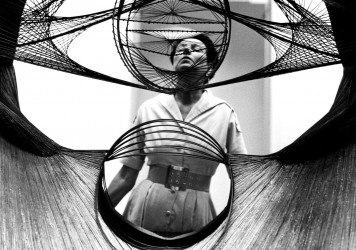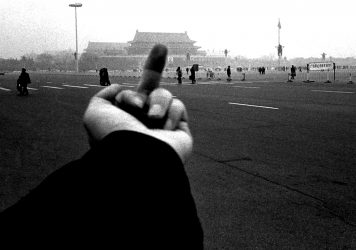Nathaniel Kahn’s insightful survey – and subtle critique – of the contemporary art world, featuring Jeff Koons, Larry Poons and more.
This documentary by Nathaniel Kahn focuses on the vagaries and sometime cruelties of the art market right now. It deserves its title on the technicality that anything these days can be contemporary art. Cool and nominally neutral, there is nonetheless a genius use of one scene from Martin Scorsese’s grim and glossily-reproachful The Wolf of Wall Street that makes the director’s feelings on the subject crystal clear: intercut with an anecdote about Jeff Koons’ time on Wall Street, we see Leonardo DiCaprio’s Jordan Belfort closing an impossible deal as if it were no thing.
There are other Wall Street movies that might have been used here, making it feel pointed, even barbed, that The Wolf of Wall Street is the one selected – an astounding satire of greed under capitalist rule, it wore its opprobrium as lightly, and therefore as stylishly, as a Brooks Brothers suit, with the result being an unclear moral compass. To those with what might be called the “right” view, meaning cinephiles with left-wing morals, it was Bonfire of the Vanities as seen by Breugel; to the uninitiated, or suggestible, it looked like an expensive flashback episode of Entourage with better acting.
It does exactly what The Price of Everything does, which is to spin potential ambiguity into a noose until its worst participants, quietly and perhaps subjectively, proceed to hang themselves. When the collector Inga Rubenstein suggests that a Bjarne Melgaard sculpture of a black woman on all fours is a got-to-have-it craze among her friends, it is extremely hard to swallow the idea that none of this is scripted.
It is even harder to imagine Rubenstein seeing herself as any kind of villain, since she is just doing what the market has told her to do. Like the aphorism about owners and their dogs, Jeff Koons has come to resemble one of his artworks more and more each year: smooth, larger than life, quintessentially American, and actually not that deep. When the staff at Sotheby’s describe his latest work as “lobby art”, it’s true, but it doesn’t make the art world seem any less fickle or unkind.
“Making money is art,” Andy Warhol once said, though it might as easily have been Belfort, or Koons. “And working is art, and good business is the best art.” Warhol’s ‘Double Elvis’ is the seventh-biggest art sale of 2017 so far, at $37 million. Does this make it 2017’s seventh greatest artwork? This depends on whether you consider “value”, and “artistic value” in particular, to be especially closely linked with finance.
In The Price of Everything, there is one storyline that is especially moving – that of Larry Poons, an abstract painter whose contemporaries ended up being more famous, largely because Poons refused to keep the same, saleable style. Living in what is effectively a cabin in the woods, deaf and habitually throwing out his hearing aid so that he can trek out into the forest without hearing galleries call-or-not-call, Poons seems like the most Zen participant in Kahn’s film, and does not appear to wish he’d sold out for a higher price.
One last thing: when Poons’ wife eventually led the camera into his ramshackle studio, and I saw every wall covered in canvas, and that canvas was bedecked in splattered and erratic paintwork, pink and green and blue and yellow and moving like life, or like love, I cried. How much is that worth? I don’t know; there is no price for it.
Published 15 Nov 2018
For somebody who worked as an art critic, this as certain to have some degree of ‘inside baseball’ pleasure.
More moving than one would imagine a film about commerce to be, exactly as moving as a film about art should be.
A necessary exploration of a thorny topic, cloaking its criticism with distance and dry wit.

Director Lisa Immordino Vreeland offers a fascinating and outrageously funny look at the New York bohemian.

Frederick Wiseman delves deep into one of New York City’s most beloved public institutions.

Alison Klayman directs this absorbing, stirring documentary portrait of the controversial Chinese artist.